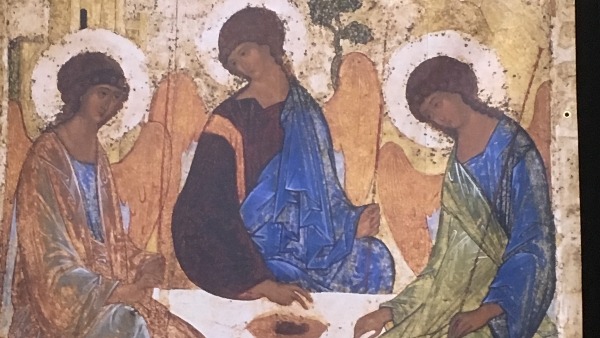I grew up afraid of God. Perhaps due to the particular brand of American Christianity I grew up in, I often had nightmares about being “left behind” for my moral failures. I switched faith streams in college, but fear found me there, too, in the form of carefully constructed theological boundaries meant to avoid the ever-present danger of “heresy.”
In particular, I perceived the idea of the Trinity to be the most delicate and difficult of Christian doctrines, one better left to those who earn PhDs in (evangelical) theology. God as Three in One represented for me a pure theological needle in a jumbled haystack of impure “isms” such as modalism, Arianism and Docetism. Getting it right was like choosing every one of my March Madness picks correctly. (Odds: 1 in 128,000,000,000.) So rather than mess it up, I labeled it “Fragile: Handle With Care” and put it on the proverbial shelf where I could ignore preserve it.
Notice I wrote, “I…put it on the…shelf,” because the Trinity didn’t like it “on the shelf” and started showing up everywhere in my life — in the Celtic mythology that I grew to love, in the lives of saints I admire, in the name of a local church that means a lot to me, in my strange but growing affinity for groups of three.
I lack the patience of careful observation and tailored precision toward proper iotas that’s needed to excel in the important field of academic theology. But I do notice when a common thread connects with my interests in literature, philosophy, theology and praxis.
The more accessible God as Three in One felt to me, the less I needed to label the Trinity as “Fragile.” Then, recently, a friend recommended a couple books that happened to be about the Trinity, our church went through a discernment process that included writing a simple statement on our understanding of God, I attended a conference for spiritual directors on, you guessed it, the nature of the Trinity, and my oldest daughter started reading The Shack. (No, we haven’t seen the movie yet.)
So I said to myself, “I’m sensing a theme here.” I read the books my friends suggested and I’ve reflected on the conference I attended, and now I regret all the years I’ve avoided engaging with God as Trinity. Like Linus from Peanuts, with his blue security blankey, I’ve even taken to carrying around in my satchel copies of trinitarian icons from Christian history. Somehow they help me remember that love in dynamic relationship is at the core of all life and reality, even as hate and fear seem to rule the world, that everything is alright, even when I don’t understand why things are the way they are, and that everything is going to be made right, even when that seems impossible.
If you’d like to explore God as Trinity, I highly recommend:
- God, Sexuality and the Self: An Essay ‘On the Trinity’ by British systematic theologian Sarah Coakley,
- The Holy Trinity and the Law of Three: Discovering the Radical Truth at the Heart of Christianity by American Episcopal priest Cynthia Bourgeault, and,
- The Divine Dance: The Trinity and Your Transformation by Franciscan priest Richard Rohr.


